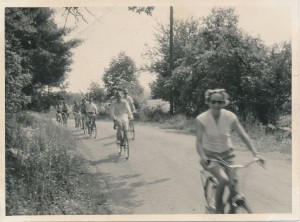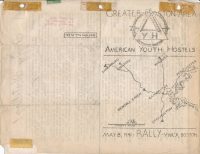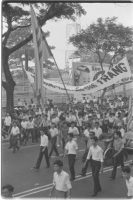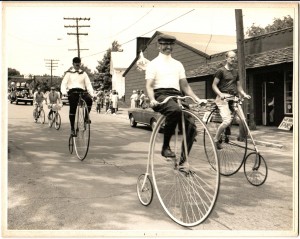University Archives & Special Collections in the Joseph P. Healey Library at the University of Massachusetts Boston is pleased to announce that a number of our collections related to the history of bicycling have been processed and are now available for research. This is the third of several planned posts on Open Archives News that will highlight recently-processed collections in University Archives & Special Collections related to the history of bicycling.

American Youth Hostels, photograph of bicycling tour, circa 1950-1959. Pictured are a group of cyclists on a tour coordinated by the American Youth Hostels.
American Youth Hostels records, 1874-2012, bulk 1936-2007
The idea of the youth hostel was conceived in 1909 by Richard Shirrmann, an elementary school teacher living in the industrial center of Germany, who wanted to introduce youth to the countryside (1). Shirrmann’s idea caught on and by 1932, Germany had more than 2,000 youth hostels recording more than 4.5 million overnights annually. In the meantime, the movement spread throughout Europe as another 600 hostels opened (2).
That same year, the first international meeting for hosteling associations was held in Amsterdam to develop common standards, and the International Youth Hostel Federation was formed. Isabel and Monroe Smith attended the second international meeting in 1933 (1). Isabel Smith was an art schoolteacher and Monroe Smith a Boy Scout leader.
In 1934, the Smiths established the first American Youth Hostels (AYH) in Northfield, Massachusetts. A chain of hostels was subsequently set up in Vermont and New Hampshire in the summer of 1935. These early hostels were located on farms, with support from a local committee (2).

American Youth Hostels photograph of Dr. Dudley White with a group of cyclists, circa 1950-1959
It didn’t take long for the youth hostel movement and its mission to spread. By May 8, 1947, the proposed by-laws from Article II of the Greater Boston Council of the American Youth Hostels stated: “the purpose of the Council shall be to help all, but especially young people, to a greater knowledge, use and love of the countryside, and to make available to them the cultural and educational benefits of travel, both here and abroad, particularly by establishing, maintaining and inspecting youth hostels within the Greater Boston area and assisting in their establishment in the surrounding areas; by arranging hiking, cycling, skiing and other trips or activities, and training trip leaders; and by providing an information service; to maintain a Council office and staff; to endeavor to promote within the Greater Boston area the development and greater service of youth hostels generally” (3).
The AYH incorporated bicycling as part of their programming during the Great Depression, appealing to the AYH mission to promote travel, health, and the enjoyment of the outdoors (4). AYH cycling tours in length and included day trips and overnight trips exploring the countryside, neighboring communities, various states, Canada, Europe and South America.
By the post-war period, the bicycling world often merged with the AYH. During the 1950s, future founder of the Charles River Wheelmen, Fred Chaffee, led popular cycle and nature tours at AYH (4). In 1964, AYH joined the bicycle industry to kick off “American Bike Month” in response to the increase in pollution (4). John Leek, who worked from 1975-1978 at the Bicycle Repair Collection in Cambridge, and hosted the first office of Bikes Not Bombs, led many AYH bicycle tours (4). During the mid- to late-1980s, the AYH joined the Boston Area Bicycling Coalition and the Charles River Wheelmen to host numerous Grape Nuts Bike Festivals in Boston (4).

American Youth Hostels newsletter, 1941 May 8
The American Youth Hostels records consist of board agenda, minutes, reports, charters, contracts, notes, newsletters, correspondence, by-laws, flyers, clippings, maps, photographs, scrapbooks, CDs, and one VHS tape. A listing of American Youth Hostels clubs established between 1965 and 1967 resides in folder 19 of Series I. A short history on hostels entitled “Highroad to Adventure – The Hostel Way: A slide show by the Greater Boston Council American Youth Hostels, by Stephen Sloss, 1977” can be found in Series VI. Scrapbooks.
View the finding aid for this collection here.
Read more about the various bicycling-related collections in University Archives & Special Collections at UMass Boston here, and learn more about researching the history of bicycling here. To learn more about the AYH’s involvement in and the cultural history of bicycling keep an eye out for the anticipated 2018 publication of Boston’s 20th Century Bicycling Renaissance: Cultural Change on Two Wheels by Lorenz J. Finison.
For questions about these collections or to schedule a research appointment, please contact library.archives@umb.edu or 617-287-5469.
SOURCES OF INFORMATION
- “Hostelling International USA: History of Hostelling.” HI USA. 2014. Web. 21 Sept. 2015.
- Series I. Organizational Records, 1945-2011, folder 17. Leader’s Manuel Part 1 revised, January 1991.
- Series I. Organizational Records, 1945-2011, folder 1. Secretary’s reports [minutes], 1945- 1950.
- Finison, Lorenz J. Boston’s 20th Century Bicycling Renaissance: Cultural Change on Two Wheels. Anticipated publication 2018.
University Archives & Special Collections in the Joseph P. Healey Library at UMass Boston collects materials related to the university’s history, as well as materials that reflect the institution’s urban mission and strong support of community service, notably in collections of records of urban planning, social welfare, social action, alternative movements, community organizations, and local history related to neighboring communities.
University Archives & Special Collections welcomes inquiries from individuals, organizations, and businesses interested in donating materials of an archival nature that that fit within our collecting policy. These include manuscripts, documents, organizational archives, collections of photographs, unique publications, and audio and video media. For more information about donating to University Archives & Special Collections, click here or email library.archives@umb.edu.










